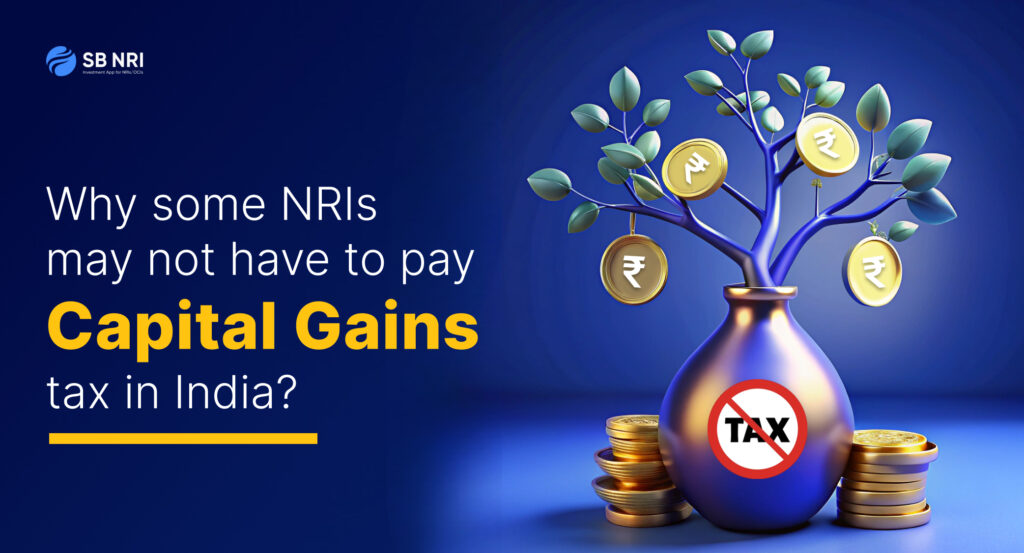
A recent ruling by the Income Tax Appellate Tribunal (ITAT), Mumbai, has brought a wave of relief—and opportunity—for NRIs investing in Indian mutual funds. If you’re an NRI living in a country that has a Double Taxation Avoidance Agreement (DTAA) with India, such as Singapore or the UAE, this ruling could mean zero capital gains tax in India on your mutual fund redemptions. Let’s break down this mutual fund tax exemption!
What Was the Case?
The ITAT’s decision came in the case of Anushka Sanjay Shah, a Singapore-based NRI who earned ₹1.35 crore in short-term capital gains from Indian mutual fund redemptions (₹88.75 lakh from debt funds and ₹46.91 lakh from equity funds) in the 2021–22 financial year.
She claimed exemption from capital gains tax in India under the India-Singapore DTAA, arguing that such gains are only taxable in her country of residence.
The Indian tax officer disagreed, stating that since the mutual fund units derive value from Indian assets, the gains should be taxed in India.
But the ITAT ruled in her favor.
Why the Exemption?
The ITAT ruling hinged on a key interpretation of the India-Singapore tax treaty—specifically, Article 13, which outlines taxation of capital gains. Here’s what it clarified:
- Mutual fund units are not shares.
The ITAT emphasized that mutual fund units in India are issued by trusts, not companies. Hence, they don’t fall under the “shares of a company” category in the treaty. - Residual clause applies.
Since mutual fund units aren’t directly covered under a specific asset class like shares or immovable property, they fall under the treaty’s “residual clause.”
This clause grants exclusive taxing rights to the country of residence of the investor—Singapore, in this case.
In short, Singapore taxes these gains (if at all)—not India.
Countries Where This Could Apply
India has similar tax treaties with several other countries. If you’re an NRI residing in one of the following, this ruling could apply to you too:
- United Arab Emirates
- Mauritius
- Netherlands
- Portugal
- Spain
- Switzerland (based on specific terms)
Each of these countries has a DTAA with a residual clause or equivalent provision. If your country of residence does not impose capital gains tax, like the UAE, this could make your mutual fund gains completely tax-free.
Also read: Understanding the Double Taxation Avoidance Agreement (DTAA) and Its Benefits
Are You Paying Tax in India Unnecessarily?
Many NRIs are still unaware of the tax treaty benefits. As a result, they end up paying capital gains tax in India—even when the DTAA gives the taxing right solely to their country of residence.
Important Compliance Tip: TRCs Are a Must
To claim the benefit under DTAA, NRIs must obtain a valid Tax Residency Certificate (TRC) from their country of residence.
In some countries like the UAE, there can be two types of TRCs:
- One for domestic purposes
- One for claiming DTAA benefits
The process can take time. So, plan ahead, especially if you’re making large redemptions or structuring tax-efficient investments.
What’s the Tax Rate If You’re Not Eligible?
If the treaty doesn’t apply or you can’t furnish a TRC, here’s how India currently taxes mutual fund gains:
- Equity Mutual Funds
- Short-term gains (STCG):
- 15% (for units sold before July 23, 2024)
- 20% (for units sold on or after July 23, 2024)
- Long-term gains (LTCG):
- 10% (for units sold before July 23, 2024)
- 12.5% (for units sold on or after July 23, 2024)
- Short-term gains (STCG):
- Debt Mutual Funds
- Debt mutual funds offerings will continue to be taxed at the investor’s slab rate irrespective of the holding period. However, investments made before April 1, 2023, and held for more than 24 months will be taxed at 12.5% as long-term capital gains (without indexation benefit) under the new rules.
What Should NRIs Do Now?
- Check if your country has a DTAA with India that includes the residual clause for capital gains.
- Discuss this ruling with your tax advisor or CA.
- Ensure you obtain a valid TRC before making redemptions.
- Consider tax-efficient investment strategies based on your country of residence.

Game Changer!
This ITAT ruling is a game changer for global Indian investors. With the right planning and documentation, NRIs from several countries may legally avoid capital gains tax in India on mutual fund redemptions.
The key?
Knowledge + Documentation.
Don’t pay what you don’t owe – plan smarter, invest wiser.
FAQs:
Q: What is the recent ITAT ruling on mutual fund tax for NRIs?
The ITAT ruled that mutual fund capital gains are not taxable in India if the NRI resides in a country with a DTAA that includes a residual clause.
Q: Who can benefit from this mutual fund tax exemption?
NRIs residing in countries like Singapore, UAE, Mauritius, Netherlands, and Portugal may benefit, depending on their DTAA with India.
Q: Why are mutual fund units not treated like shares under the tax treaty?
Because mutual fund units are issued by trusts—not companies—they fall under the residual clause, not the “shares” clause.
Q: What documents are required to claim the tax exemption?
A valid Tax Residency Certificate (TRC) from your country of residence is mandatory to claim treaty benefits.
Q: Do I still need to pay tax in my country of residence?
That depends on your country’s tax laws. Countries like UAE and Singapore have no capital gains tax, making this a tax-free opportunity.
Q: What if I don’t have a TRC at the time of redemption?
Without a TRC, you may not be able to claim the DTAA benefit and might be taxed in India by default.
Q: Can Indian citizens take advantage by shifting tax residency?
While technically possible, experts warn this could be seen as tax avoidance. The exemption is meant for genuine NRIs with valid residency.



